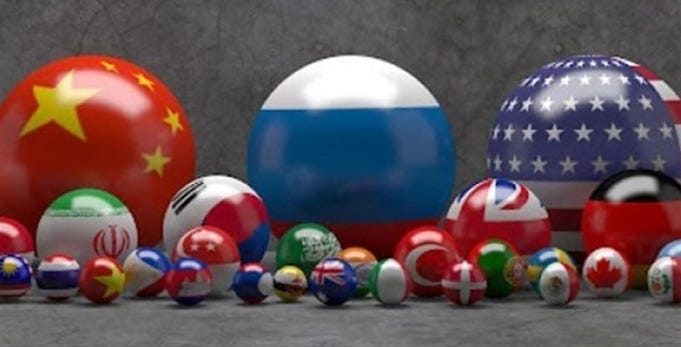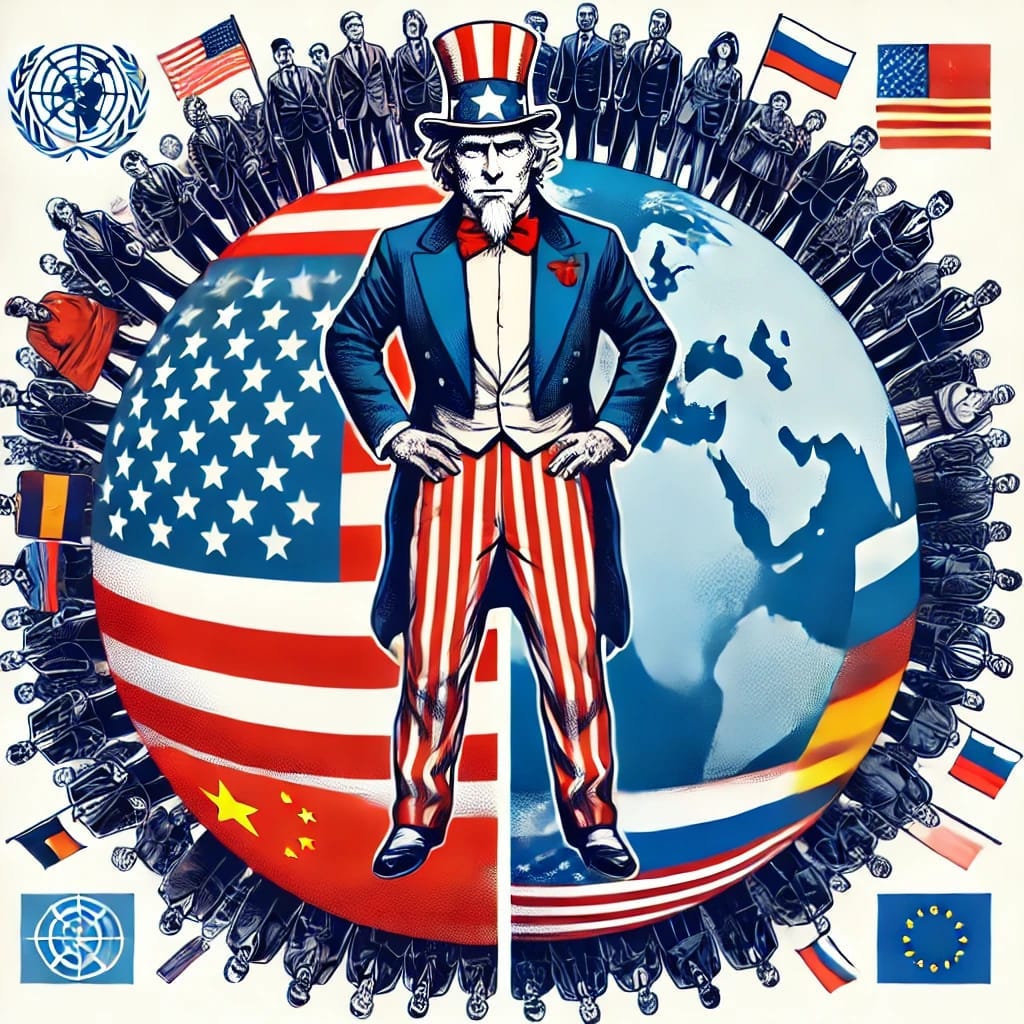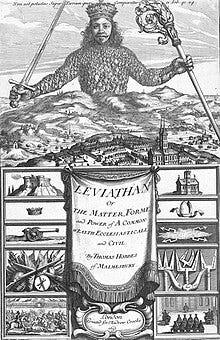Why Libertarians Should Support a Multipolar World
The quest for freedom internationally inevitably leads one to support the multipolar world order.
The tense international situation has intensified a debate that has existed for at least a decade, between two radically different views of the world and of international relations: the unipolar and the multipolar world.
When libertarians disagree on foreign policy, that difference of world view is often the underlying cause. Yet, it is possible to show that the concept of the unipolar world is contrary to the principles of libertarianism and that the multipolar world is an important step in the direction of liberty internationally.
Unipolar vs Multipolar
As a reminder, the "unipolar world" is a world led by a single pole of power. It is actually a typically Western concept, with its roots in the Enlightenment’s idea of universal values, originally emanating from the West but inherently applicable to all. It is represemted today by the so-called the "liberal rules-based international order" centered around Washington D.C. This international order is a flexible, even fuzzy, concept, distinct from international law, even though the two sometimes coincide.
This is the world that the United States, with its Western allies, have tried to promote and realize since the fall of the USSR in 1991.
The idea underpinning the concept of unipolarity is that the Western political systems, the "liberal democracies," have a moral superiority that justifies that the world be ruled exclusively by the West - in practice, by Washington. It is therefore by definition a power of hegemonic ambition, which is preordained in the sense of Fukuyama’s theory of a Hegelian “End of History”. For the United States this is nothing new, since it fits nicely with the idea of “Manifest Destiny” which harks back to the 19th century, and even further to the “shining city on a hill” of the Pilgrims.
The unipolar world is a concept that is natural to a maritime power, like Britain then and now the US; a power that is often unsure in foreign lands, but confidently using using the seas for commercial control. It is a world in which nation-states lack independence; they are dominated - for their own good, of course - directly by the single center of power and also indirectly by Western approved supranational institutions, like the UN and the EU, lending allegiance to that single pole.
The concept of "multipolar world", on the other hand, is the opposite of the world described above; it is concept rather attuned to continental powers, which by nature have to find ways to coexist with their eternal neighbors. It is a world that much more strictly respects international law, as expressed in the Charter of the United Nations.
No value judgment is applied to the political system of “others” in this view of international relations. On the contrary, political systems are seen as products of specific political cultures and histories. The multipolar world is therefore not universalist, which is why it is so difficult for the West to join it or even understand it. In this view, global political power is divided and shared in a multitude of poles, and nation-states can be members of, but not subjected to, supranational institutions.
As these short descriptions show, these two world views are mutually exclusive, and this explains in large part the almost ideological tensions that currently exist in international relations, roughly between the West and the “Global South” (to which Russia belongs).
Why Not Support the Unipolar World?
It might seem strange at first glance that libertarians should prefer a multipolar world to a unipolar one. After all, the unipolar world is the world centered on the West, which is often deemed more respectful of liberties than the rest of the world. Moreover, libertarians are ideologically committed to an open world, with a minimum of political and legal obstacles that can hinder free trade between companies and individuals operating in different political entities.
Would it not then be natural for libertarians to be in favor of a unipolar world, in which eventually a single world political entity - hopefully benevolent - manages the world as it sees fit, ensuring peace and free trade, at the same time weakening the political boundaries between nation-states?
The answer to this question is emphatically "No". The support of a unipolar world is a fundamental error of classical liberalism, too rooted in the universalist view. Firstly, and more obviously, there is never a guarantee that the only existing pole of power, the Hegemon, will be benevolent and peaceful - what if it is not? In fact, the common support for the unipolar world today in the West can often be explained by a lack of knowledge of the true nature of the Federal Government of the United States, even though it has been exposed over many decades by intellectuals and journalists such John T. Flynn, Noam Chomsky, Robert Higgs, Eduardo Galeano, and John Perkins, to name but a few.
Moreover, the unipolar world is not as free as it likes to see itself, neither economically nor politically. Examples abound of illiberal policies in the West, starting with crushing taxation that must be seen as a violation of private property. Also, there has never been a willingness among the Western elites to implement complete free trade between the West and the South, mostly to the detriment of the latter. And politically, the problems of democratic legitimacy in the West have become all too common, as decisions are made by political leaders in opposition to the will of the majority.
Further, the unipolar world is heading straight towards political globalization, which is undeniably a form of international fascism. In reality, the idea of the unipolar world was always an unjust and unstable one, favoring the corrupt Western financial system based on the US dollar reserve currency status. This model suggests various forms of coercions for nations which do not cooperate (the use of military threat obviously, the extraterritoriality principle of U.S. laws, and the cancelling of democratic elections). By its very nature, the unipolar world cannot exist without constant, illegal and unsolicited interventions in the internal affairs of countries that do not wish to fully adhere to the political positions of the sole center of power.
Non-intervention and Decentralization
The unipolar world therefore goes directly against the principle of non-intervention, which is a key tenet of libertarianism. The respect of private property at home and thus the peaceful exchange between other nations abroad is much better represented and protected by adherence to international law.
The decentralization of political power within nation-states is recognized by libertarians as fundamental. They should then also, according to the same principle, support the decentralization of political power among nations. This is, of course, tantamount to supporting a multipolar world. The benefits of decentralization have been demonstrated by libertarian historians such as Ralph Raico and Donald Livingstone; namely that competition between small European political entities for centuries was key to the economic development and political liberalization of European societies.
Yet, the multipolar world is, of course, not a sufficient development from a libertarian point of view, because of the statism that persists in this world. But it is clearly an important step in the direction of freedom internationally, in comparison to the unipolar world. Libertarians must therefore support the multipolar world and reject the unipolar world, for the reasons outlined here. This position needs to be expressed strongly, even if it is not so popular at present, because the multipolar world is still little understood and barely accepted in the West, accustomed as it is to a position of domination.






